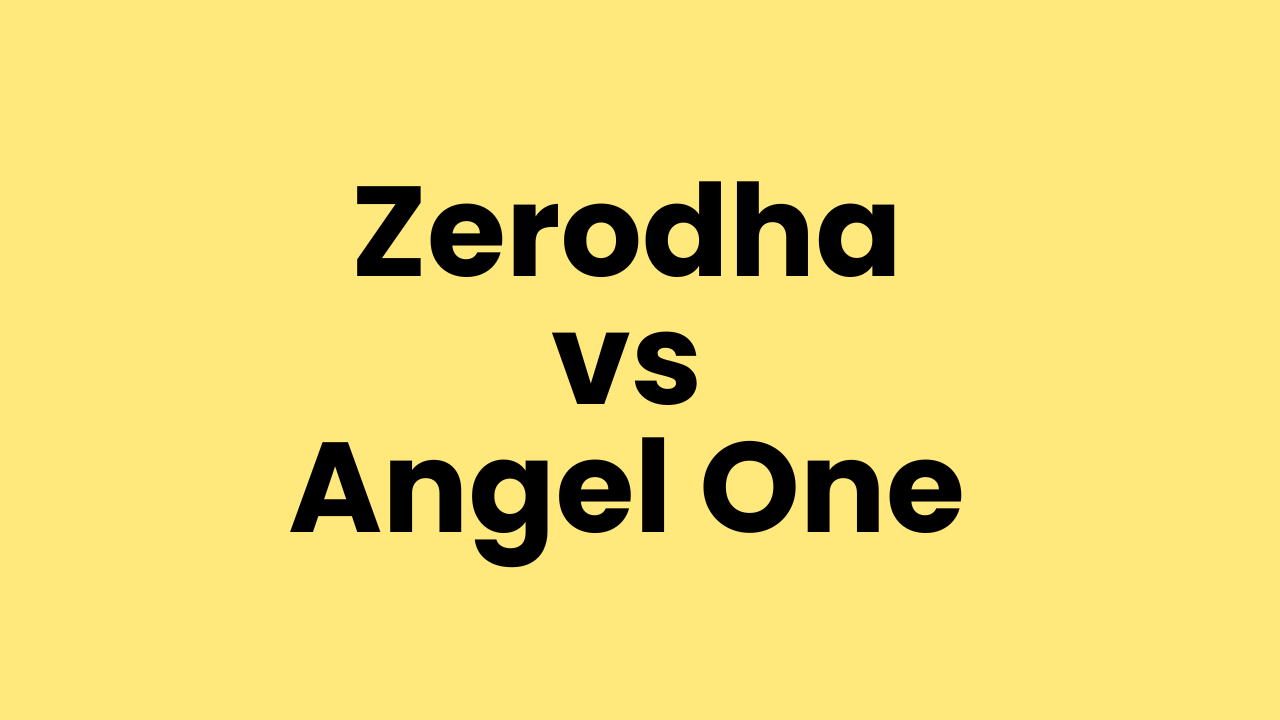Investing in the stock market has become increasingly popular in India, and with the rise of discount brokers, retail investors now have easier access to low-cost trading. Two of the most prominent discount brokers in India are Zerodha and Angel One (formerly Angel Broking).
Both companies have carved out a significant market share, offering competitive brokerage charges and innovative tools for investors and traders. However, the charges they impose on trades and investments differ, and choosing the right broker based on these costs can have a significant impact on your overall profitability.
In this article, we’ll compare the charges between Zerodha and Angel One, helping you make an informed decision. We’ll break down the key elements such as brokerage fees, account maintenance charges, and other hidden costs associated with both platforms.
Zerodha: Quick Overview
Zerodha is one of India’s largest discount brokers, known for its simple pricing structure and innovative trading platforms. It started in 2010 and has quickly become a favorite for cost-conscious investors and traders. Zerodha’s primary appeal lies in its flat fee structure and its user-friendly trading platforms, including Kite (for stock and commodity trading) and Zerodha Varsity (for educational resources).
Key Features of Zerodha
- Low Brokerage: Zerodha offers a flat fee of ₹20 per executed order or 0.03% for intraday trading and delivery, whichever is lower.
- Educational Resources: Zerodha provides free educational resources through Zerodha Varsity.
- Trading Platforms: Zerodha’s platforms are easy to use and come with a wide range of analytical tools.
- Zero Account Opening Fees: They charge no account opening fees for both demat and trading accounts.
Angel One: A Quick Overview
Angel One (formerly known as Angel Broking) has been in the market for over three decades, offering full-service brokerage services at discount rates. It has a comprehensive set of services and aims to provide users with easy access to the stock market through its advanced technology and mobile application.
Key Features of Angel One
- Flat Fee Structure: Angel One also follows a flat brokerage model of ₹20 per order for all segments, such as equity, commodities, and derivatives.
- Research & Advisory: Unlike Zerodha, Angel One offers more personalized investment advisory and research services.
- Smart Investment Tools: Angel One has tools like Angel Bee and Angel iTrade to help investors with trading decisions.
- Account Opening Fees: Angel One offers low or zero account opening fees depending on the ongoing promotion or offer.
Brokerage Comparison
Brokerage charges are one of the most important factors when choosing a broker. Let’s compare the brokerage charges of Zerodha and Angel One across different segments:
Equity Delivery
- Zerodha: Zerodha charges 0% brokerage on equity delivery. This means if you are buying and holding stocks for the long term, you will not pay any brokerage fees.
- Angel One: Angel One charges a flat ₹20 per order for equity delivery trades.
Equity Intraday
- Zerodha: Zerodha charges ₹20 per executed order or 0.03%, whichever is lower. For example, if you trade a large amount of equity, the 0.03% fee will apply.
- Angel One: Angel One charges a flat ₹20 per order for intraday trades.
Equity Futures & Options
- Zerodha: For futures and options, Zerodha charges ₹20 per executed order or 0.03%, whichever is lower. This applies to both buying and selling in the futures market.
- Angel One: Angel One charges ₹20 per order for both futures and options trading.
Commodity Trading
- Zerodha: Zerodha charges a flat ₹20 per executed order for commodity trading.
- Angel One: Angel One charges ₹20 per order for commodity trades as well.
Currency Derivatives
- Zerodha: For currency trading, Zerodha charges ₹20 per executed order or 0.03%, whichever is lower.
- Angel One: Angel One also charges ₹20 per order for currency derivatives.
Account Opening & Maintenance Charges
Both Zerodha and Angel One provide competitive fees for opening and maintaining accounts. However, the specifics vary slightly between the two platforms.
Zerodha Account Opening Charges
- Account Opening Fees: Zerodha offers free account opening for both demat and trading accounts.
- Account Maintenance Charges: Zerodha charges ₹300 annually for maintaining a demat account.
Angel One Account Opening Charges
- Account Opening Fees: Angel One offers free account opening as well, though occasional promotions may offer benefits such as discounted plans.
- Account Maintenance Charges: Angel One charges an annual AMC of ₹500 for a demat account.
Additional Charges
Both Zerodha and Angel One have additional charges that can impact your overall trading costs. Here’s a comparison of some of these charges.
Zerodha Additional Charges
- Transaction Charges: Zerodha levies standard transaction charges as per the exchanges, which vary depending on the segment and the volume.
- GST: A 18% GST (Goods and Services Tax) is applicable on the brokerage amount.
- SEBI Turnover Fees: ₹10,000 per crore turnover (SEBI charges).
- Stamp Duty: Varies from state to state.
Angel One Additional Charges
- Transaction Charges: Like Zerodha, Angel One levies transaction charges as per the exchanges.
- GST: A 18% GST is applicable on the brokerage amount.
- SEBI Turnover Fees: Similar to Zerodha, Angel One also applies the ₹10,000 per crore turnover fee.
- Stamp Duty: Varies depending on the state.
Trading Platforms Comparison
Zerodha and Angel One both offer powerful trading platforms for different types of investors. Let’s take a look at their offerings.
Zerodha Platforms
- Kite: A web-based and mobile platform that offers a simple interface and advanced charting tools.
- Pi: A downloadable platform with advanced charting, order placement, and market analysis.
- Zerodha Varsity: An educational platform that helps you learn the basics of trading and investing.
Angel One Platforms
- Angel One App: A mobile trading app with features like advanced charts, research recommendations, and real-time market analysis.
- Angel iTrade: A web-based platform that allows seamless trading and portfolio tracking.
- Angel Bee: A portfolio management tool for tracking your investments.
Charges Comparison Table
Here’s a detailed comparison table summarizing the charges for Zerodha and Angel One:
Feature | Zerodha | Angel One |
|---|---|---|
Account Opening Fee | Free | Free |
Account Maintenance Fee | ₹300 per year (for demat account) | ₹500 per year (for demat account) |
Equity Delivery Brokerage | 0% (Free) | ₹20 per order |
Equity Intraday Brokerage | ₹20 per order or 0.03% (whichever is lower) | ₹20 per order |
Equity Futures & Options Brokerage | ₹20 per order or 0.03% (whichever is lower) | ₹20 per order |
Commodity Trading Brokerage | ₹20 per order | ₹20 per order |
Currency Derivatives Brokerage | ₹20 per order | ₹20 per order |
Transaction Charges | As per exchange norms | As per exchange norms |
GST | 18% on brokerage | 18% on brokerage |
SEBI Turnover Fees | ₹10,000 per crore | ₹10,000 per crore |
Stamp Duty | As per state | As per state |
Which One is Better for You?
The choice between Zerodha and Angel One depends on your trading style, volume, and the features you prioritize:
- Choose Zerodha if:
- You want low-cost trading with no brokerage on equity delivery.
- You are an active trader and prefer a flat, transparent fee structure.
- You value educational resources and user-friendly platforms like Kite.
- Choose Angel One if:
- You want access to personalized research, advisory services, and smart investment tools.
- You prefer a full-service broker with low-cost trading options.
- You like using mobile apps with extensive features and support.
Final Verdict
Both Zerodha and Angel One offer excellent services, with a few key differences in terms of charges, services, and tools. Zerodha’s cost-effectiveness and transparency make it an excellent choice for active traders and those looking for a simple, no-frills platform. Angel One, on the other hand, offers more comprehensive advisory services and research tools, making it a better option for investors who value those aspects in addition to competitive pricing.
Ultimately, your choice depends on your specific needs, trading style, and preference

Ranjan is a dedicated finance writer for smartfinclub.com, where he specializes in comparing top financial products in India, including loans, credit cards, savings accounts & more. With a focus on providing clear insights into features, rates, and benefits, Ranjan aims to empower readers to make informed financial decisions customized to their needs.

